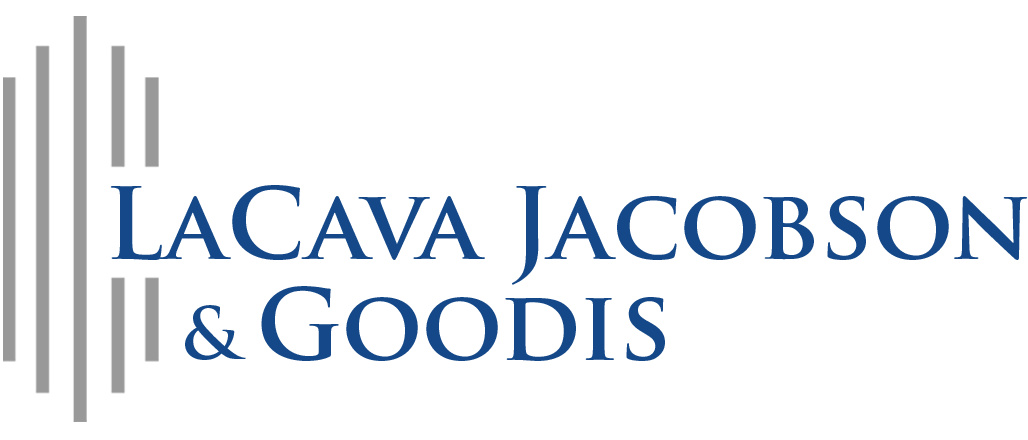Civil Trial Defense Law Firm
La Cava Jacobson & Goodis handles litigation and appeals in all Florida state and federal courts.
litigation and appeals in all Florida state and federal courts.
Fort Lauderdale
550 West Cypress Creek Rd.
Suite 150
Fort Lauderdale, FL 33309
Tel: (754) 301-5060
Fax: (754) 551-6884
St. Petersburg
200 Central Avenue
Suite 250
St. Petersburg, Florida 33701
Tel: (727) 477-1013
Fax: (727) 550-0811
Jacksonville
1200 Riverplace Boulevard
Suite 201
Jacksonville, Florida 32207
Tel: (904) 564-1900
Fax: (904) 980-9231
Tampa
501 East Kennedy Blvd.
12th Floor
Tampa, Florida 33602
Tel: (813) 209-9611
Fax: (813) 209-9511
Miami
9200 South Dadeland Blvd.
Suite 620
Miami, FL 33156
Tel: (786) 724-2600
Fax: (305) 847-3788
West Palm Beach
701 Northpoint Parkway
Suite 330
West Palm Beach, FL 33407
Tel: (561) 282-1470
Fax: (561) 689-5013
Naples
9150 Galleria Court
Suite 100
Naples, Florida 34109
Tel: (239) 300-9679
Fax: (239) 734-3546


Florida Law Weekly – January 9, 2015
/in Case LawPhillips v. Republic Financial Corporation, (5th DCA) – In this premises liability case, the Plaintiffs alleged that while performing repairs to the roof of a building, the Plaintiff fell through a skylight that was painted over, sustaining severe injuries. The Plaintiffs filed their lawsuit against the entity that owned the property and building, as well as various entities that leased the property and building. In affirming summary judgment for some of the Defendants, the Court noted that liability in a premises liability case does not depend on ownership, but rather, is predicated on the negligence of the possessor of the premises. As it is the possessor of the property who controls whether persons can come onto the property, the duty to warn of a dangerous condition on that property lies with the possessor.
Florida Law Weekly – January 2, 2015
/in Case LawDuong v. Ziadie, (4th DCA) – In this medical malpractice case, the Court addressed the adequacy of a proposal for settlement in a medical malpractice wrongful death claim that was brought by the Plaintiff acting in her capacity as guardian of her adult son who was rendered incapacitated. Plaintiff sought damages for her son’s pain and suffering as well as for the damages suffered by the son’s two minor children. The claims were brought against the son’s physician, the physician’s employer and other Defendants. A proposal for settlement was made to the physician only in the amount of $1,000,000 on behalf of the guardian and the two minor children, dividing the amounts to be paid to each.
The proposal was not accepted and the jury returned a verdict well in access of the proposal for settlement. The Plaintiff moved for attorney’s fees and the physician argued that the proposal itself was ambiguous. Specifically, the physician argued that an offer requiring acceptance of all three Plaintiffs’ claims deprived him of the ability to evaluate each claim individually as required by the Florida Rules of Civil Procedure. The Trial Court granted the motion, concluding that the offer was not ambiguous. The Duong Court agreed, opining that in this context, the “all or nothing” proposal was appropriate. The Duong Court specifically found that because the proposal broke down what part of the million dollar settlement would be paid to each of the claimants, the physician could evaluate each claim separately and determine both the reasonableness of the offer and the likelihood that the Plaintiffs would obtain, as to each claim, a verdict that would result in the enforcement of the proposal. The The Duong Court also held that there is no obligation each individual Plaintiff or claimant to make individual offers to the physician because imposing such a requirement could result in the settlement of the main claim and not the consortium claims.
Paduru v. Klinkenberg, (1st DCA)- This case involved an automobile accident with claims brought by the Plaintiff against the driver and owner of the at-fault vehicle. The Plaintiff filed a proposal for settlement naming the driver only, which provided that the Plaintiff would dismiss the case against both Defendants after the proposed amount was paid by the owner and/or his insurer. No proposal was specifically made to the owner of the at fault vehicle. The proposal was not responded to and following trial, the jury returned a verdict for the Plaintiff in an amount well above the amount offered in the proposal for settlement. Plaintiff then moved for an award of attorney’s fees and costs and in response, the driver argued that the proposal was invalid because it was unclear as to who would be released from liability and which claims would be dismissed upon payment. Additionally, the driver argued that the proposal contained a settlement condition over which she had no control.
While the Trial Court found the proposal to be valid, the Paduru Court disagreed. In doing so, the Paduru Court referred to Attorney’s Title Insurance Fund v. Gorka, 36 So.3d 646 (Fla. 2010), where the Florida Supreme Court held that a proposal for settlement must be structured in such a way so that the party to whom the offer was made can independently evaluate and settle his/her respective claim irrespective of another party’s decision. In doing so, the Paduru Court held that the proposal filed by the Plaintiff was invalid because it was predicated upon payment of the settlement by someone other than the party to whom the proposal was directed.
Florida Law Weekly – October 4, 2013
/in Case LawZebhyr Haven, Health and Rehab Center v. Hardin (2d DCA): In this case, the Second District Court of Appeal held that the trial court erred in denying a nursing home’s motion to compel arbitration on the grounds that the arbitration agreement, which required the Plaintiff to pay 40% of the costs of arbitration, was substantively unconscionable and impossible to perform. The trial court agreed that it was impossible for the Plaintiff to pay this amount in arbitration and accordingly, denied the motion to compel arbitration. The Second District Court of Appeal reversed, holding that this argument could not support the trial court’s decision because the risk associated with agreeing to the arbitration provision (that being the payment of arbitration costs) was foreseeable when the agreement was made. The Second District Court of Appeal noted that this is true even where the performance becomes impossible after execution of the agreement. The Second District Court of Appeal further noted that the Plaintiff failed to establish how performance of the contract was impossible. Finally, the Second District Court of Appeal held that because the Plaintiff failed to present evidence of procedural unconscionability (which is also required to establish that an arbitration agreement should not be enforced), the trial court was bound to enforce the arbitration provision.
Notably, it does not appear that the Plaintiff made any argument that the arbitration agreement was void as against public policy as argued in Franks v. Bowers, 116 So.3d 1240 (Fla. 2014), providing further support in opposition to the argument that the Franks Court declared all private medical malpractice arbitration agreements void as against public policy.
Florida Law Weekly August 9, 2013
/in Case LawPublix Supermarkets Inc. v. Marisol Santos, (3d DCA): In this slip and fall case, Publix filed a Petition for Writ of Certiorari to quash the Trial Court’s discovery order that instructed Publix to provide the plaintiff with all incident reports and information relative to any similar occurrences in Publix stores throughout the State of Florida. The Appellate Court granted the Petition and quashed the Order, finding that the discovery request provided the plaintiff with carte blanche access to irrelevant discovery. The case involved an incident where the plaintiff allegedly slipped on “old wet spinach or some other transitory substance.” The plaintiff sought discovery of all slip and fall incidents at the specific store where she fell for all dates three years prior to her accident. After being advised by Publix that no other similar incidents occurred at that store, she sought to depose a Publix representative and requested information regarding all incidents relative to any similar incidents over the same time frame at any Publix store in the State of Florida. Publix moved for a protective order, contending that pursuant to the standards set forth in Fla. Stat. 768.0755, it did not have to produce all of this information because it was not necessary for the plaintiff’s case. The Trial Court disagreed.
The Appellate Court quashed the Trial Court’s Order. In doing so, it concluded that pursuant to Fla. Stat. 768.0755, (which requires the Plaintiff to prove actual and/or constructive notice of the dangerous condition), the information sought by the plaintiff was not required to establish her case. The Appellate Court specifically stated that the Florida legislature, in enacting Fla. Stat. 760.0755, required plaintiffs to establish notice with respect to the “business establishment” where the incident occurred.
From the July 12, 2013 edition of Florida Law Weekly
/in Case LawFI-Evergreen Woods LLC v. The Estate of Virginia Vrastil (5th DCA): This is a wrongful death case where the decedent was admitted to a nursing home. At the time of admission, paperwork was signed, including an arbitration agreement. Following the decedent’s death, the personal representative of the Estate sued the nursing home for breach of fiduciary duty and violations of Fla. Stat. 415.1111. The defendant nursing home moved to stay the proceedings to compel arbitration. The Trial Court, without conducting a hearing and without determining whether the arbitration agreement had been entered into, denied the motion to compel arbitration, ruling that the arbitration agreement proffered by the defendant limited the statutory remedies available to an injured nursing home resident and as result was void as against public policy. The initial argument on appeal was that the Trial Court erred in not conducting an evidentiary hearing as required by Florida Statute 682.03 (1). The Appellate Court agreed and remanded the matter back to the Trial Court.
The Court of Appeal then addressed the plaintiff’s argument with respect to the arbitration agreement being void as against public policy. The Court of Appeal found that the provisions of the arbitration clause did not violate public policy. The Court of Appeal went into great detail in distinguishing the arbitration agreement before it versus the agreement presented to Florida Supreme Court in Shotts v. OP Winterhaven, Inc., 86 So. 3d 456 (Fla. 2011), which was found to be void. Specifically, the Court of Appeal found that the arbitration agreement before it did not limit any of the plaintiff’s statutory remedies. Because of this, the Court of Appeal found that none of the grounds relied upon by the Trial Court sporting its finding that the proffered arbitration agreement was void as against public policy. The Court of Appeal further found that the other arguments brought by the plaintiff, mainly the limitations on discovery and the costs associated with arbitration, did not render the agreement void as against public policy.